The rise of populism
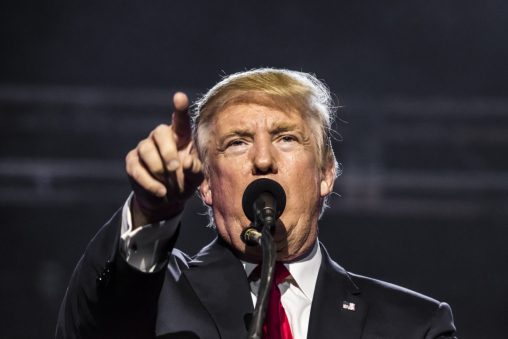
The past few years have seen the rise of a new phenomenon on the political scene – that of populist leaders, who have come to challenge the established order. Are they a menacing threat, as some claim, or leaders willing to shake up the political system and make the will of the people be heard?
To make any sensible comment about the rise of populism in large parts of the world there is no alternative but to look back and survey the path that has led to where we are today. For most of the post-war period, the political scene in the Western World was dominated by moderate centre-left and centre-right parties. The virtual hegemony they enjoyed was made possible by a number of factors, including the pacifist spirit that followed after the horrors of two world wars, a period of prosperity and relative stability, as well as the binding force of a Cold War bi-polar world.
The latter bound the Western constitutional democracies together and reduced the threat of extremism, for which there was in any case little appetite. It was an era of moderation and humanist ideals, in which the West decolonised, underwent a social and sexual revolution, and modernised its economy along the way. With the conclusion of the Cold War at the turn of the 1990s, the doctrine of free enterprise, moderate democracy and liberalism seemed to have won the day, and a new dawn of modernity, reason, progress and prosperity appeared to be on the horizon.
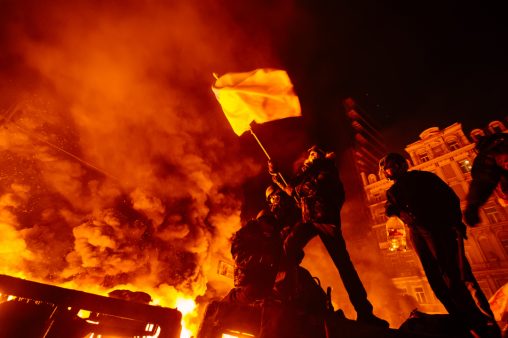
Where it started to go wrong
With the exception of the USA, the period between the 1960s and 1980s had seen a balance maintained between an economic system of free enterprise and moderate capitalism on the one hand, and an element of social-democratic redistribution on the other. On the positive side it modified wealth imbalances and kept society cohesive, but on the negative side it imposed a heavy tax burden on the working population and was increasingly open to abuse.
Under American influence, the 1980s saw a gradual shift away from this system towards a more openly capitalist one, yet what has remained is an unsatisfactory legacy in which governments have continued to impose heavy taxes and the welfare state continues to be a drain on the economy while at the same time no longer being able to reduce the now growing disparity between rich and poor. Indeed, poverty, which had virtually been eradicated in many advanced countries during the 1960s and 70s, is once again among us.
The cost of an ageing population pyramid inverted since the baby boom of the 1960s – and partly a product thereof – the rising cost of labour, the growing might of the multinationals and the rise of the global economy all came to challenge the social-democratic system that had maintained the social and political balance of power so well. As whole industries closed down and millions of workers became permanently unemployed, so a newly non-working class developed that viewed the changing world with anger and confusion, and was seen as a burden on society.
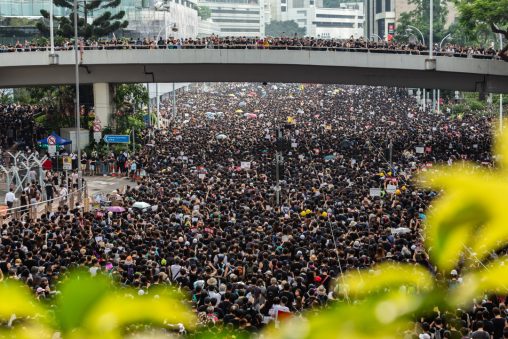
New realities
The above conditions have led to an ever-diminished yet still somehow incredibly burdensome welfare state that has been cutting back since the late 1970s but continues to press heavily on professionals and the owners of small to medium sized businesses. In those countries with a more socialist bent, this along with job protection has stifled the economy, all but killed innovation, caused a brain drain and led to militant protectionism on the part of trade unions and interest groups.
Though little of this was immediately evident after the fall of the Berlin Wall and the Iron Curtain, the conditions for future disgruntlement were already well established. The immediate post-Cold War period produced a honeymoon of sorts, in which the USA spoke of a New World Order that sounded hopeful, but in the end found its ultimate expression in forcing through the doctrines of Free Trade and regime change. At a time when the Chinese giant hadn’t quite awoken yet, the USA now found itself unopposed in its quest to open up entire continents and their markets, assets and resources to its corporate giants.
The mergers and acquisitions that had been happening for several decades now accelerated rapidly, with US corporations and funds stepping into new parts of the world and absorbing their contents. It sped up the process that was already under way in many other parts of the world, where inefficient industries or those unable to compete with cheap labour competitors were either bought and restructured (downscaled) or done away with altogether. This fate befell Eastern Europe with particular intensity, and though the culling of old industries was generally necessary, there has been little in the way of replacement.
For those whose parents once worked in national industries, mass unemployment or at best a job in one of the foreign hyper stores or distribution centres await. Many such countries have now effectively become client or ‘sleeper’ states that produce nothing but exist for the purpose of adding to the client base of the same global corporations that have asset-stripped their economies and resources.

The changing West
In such a changing economic environment political changes would almost certainly follow, and after two decades of New World Order in which American-style capitalism and commercialism were spread ever more effectively through the doctrine of Free Trade, the world certainly does look different to the one we lived in some 25 years ago.
Where the politics of economics has shifted quite strongly to the right, and people now seem remarkably accepting of hard-core capitalism and the apparently inherent right of large corporations to act only in their own interests and be above the law, the social political agenda has shifted quite radically to the left in a process that began with the hippie and sexual revolution movements of the 1960s, and has been moving the goal posts ever since.
The onslaught of demands by feminists, LGBT organisations and minority interest groups has been growing steadily over the past half century to the point where it is now reaching a crescendo of madness. In an age where most reasonable people have accepted equality on the basis of gender, race and sexual orientation, and this is also encoded in law, the battle rages on with ever more abstract and ridiculous burning platforms that are wasteful, entirely self-indulgent and indeed self-serving.
While it is important to protect the interest of specific groups of society, the bigger picture should always involve maintaining a balance in the interests of all, and of society in general. Yet instead of imposing a culture of mutual respect and acceptance, even if we are different and have opposing ideas, certain groups have been allowed to become the untouchable accuser, and others the intrinsic evil that needs to be eradicated.
Instead of talking about the true issues of the day that affect us all – such as the environment, the role of big business and big capital in society, the associated impact of Artificial Intelligence on employment, over-consumption, social problems of exclusion, over-population and the associated mass immigration from one part of the world to the other, not to mention government corruption and continued lack of peace and stability – we are now engaged in vitriolic debates about whether to call a boy a girl or a girl a boy – an exercise in futility if ever there was one.
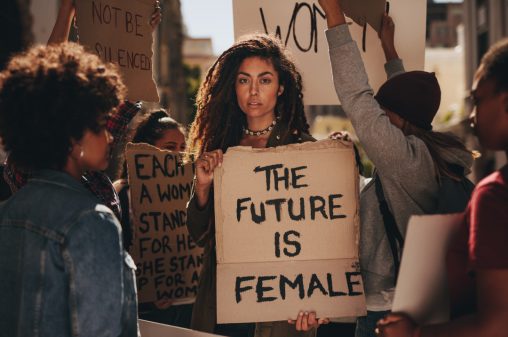
Growing disgruntlement
Looking back over the recorded history of human civilisation you would draw the conclusion that we have reached the stage of madness and decadence that is the prelude to a large fall or even collapse of society. Certainly, the world seems to be speeding up, becoming increasingly ill-mannered and selfish, self-obsessed and violent, with the gap between rich and poor expanding as rapidly as the population continues to spill over and wreck the environment.
Far from being more tolerant, respectful, rational and peaceful, the world is increasingly becoming a place of hatred, violence and extremism. What’s more, virtually all those on the barricades – be they reactionaries, feminists, LGBT activists, minorities, religious zealots or neo-Nazis – appear to be equally radical and intolerant, and where once this was limited to the Third World it has now well and truly entered the advanced societies too.
Many of us have more material prosperity than ever before, yet we grow increasingly angry and dissatisfied. Everyone seems angry. Young Muslims brought up in Sweden and France turn their back on the very West that fed, clothed and protected them, only to join murderous fanatics in pursuit of some Fourth Reich in the desert. Though they live in the only society known to mankind where men and women are officially equal, today’s feminists attack a largely imaginary patriarchal conspiracy against them while totally ignoring the plight of women across the rest of the world.
Disgruntled unemployed masses are easy targets for more extremist viewpoints, be it the poisonous ideology of radicalised Islam, the marching bands of neo-Nazis or those who promise to roll back the onslaught of globalist capitalism. The latter also feeds extreme left-wing groups, as does the continued abuse of the environment, just as the growing waves of mass immigration and the taboo surrounding this subject are leading more and more people to anti-immigration parties.
What I’m saying is that populism is not the issue or the problem, it is the symptom of an existing problem that has its roots elsewhere – in all the issues mentioned above, from unemployment and economic exclusion to fears about the environment and corporate dictatorship, and indeed fatigue with the never-ending burning platforms of liberal fanatics. Whether it’s economic, political, social or cultural in nature, there are many reasons right now why all kinds of people are steering away from the establishment that has ruled them since the 1940s. Firstly, such parties have become like corporations themselves, telling the voter what he/she wants to hear, only to do as they please anyway.
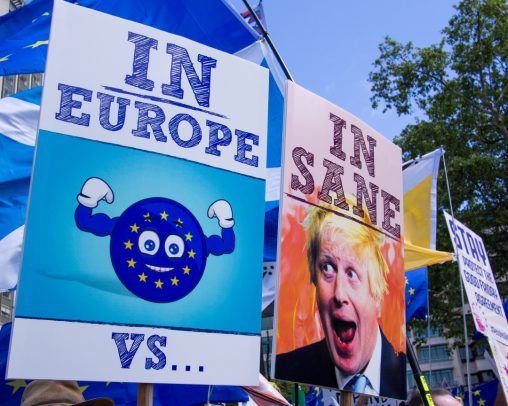
People in the West have a renewed sense that they are not being listened to by their leaders, that their leaders are not acting in their interests or those of their country, and that their futures are slipping away from them in an increasingly scary and hostile world. In the face of all this angst and all these uncertainties, the distant political elites seem not to feel what we feel and just want business to carry on as usual. Of course, because that suits them, but not many of us.
Populism isn’t the problem, the current malaise that leads people to it is. It is the product of the abuse that led to its creation, just as extreme capitalism and poverty in the past led to the rise of communism and fascism, so now we have a resurgence of populism and also the existence of militant expansionist Islamism. Add to this the revival of global competition and tensions, this time between the USA, China and Russia, and the conditions for a reaction were long in the making.
Power brokers shouldn’t ask themselves why people are moving to populist movements, be they right or left-wing, much less criticise and sensor them in the name of ‘freedom’, but come to grips with the fact that their failings have led us here, and focus on how best to fix what they have broken.
First published in Essential Magazine










